I arrived at the Crossroads shortly before 9:30 a.m.—a half-hour early, with plenty of time to add ice to my cooler and gas to my tank. I had driven all morning under an overcast sky, but now the clouds were gone, and the temperature was rising toward ninety. Although catching a trout on an afternoon like this in a shallow spring-fed pond would be close to impossible, I knew crazier things could happen. I, for example, was escorting John Gierach to John Voelker’s famed Frenchman's Pond.
With more than twenty books on the topic, John Gierach was one of the most successful fishing writers of all time, and one of the country’s best known fly anglers. He wrote with a folksy everyman voice, sometimes masking the exceptional craftsmanship of his prose. Void of sentimentality and self-indulgence, his stories served as a user’s manual for a life well-lived. One of my favorites recounts an ordeal in which a gas tank leak from a neighboring station poisoned his home’s well. He sold his house to the station's parent company for its value before the contamination, plus a little extra for his trouble. When his attorney suggested they could get another million dollars, John declined. The attorney said he’d never had a client walk away from money, to which John replied, “Most of us don't want money; we just want relief from the struggle for it,'' which was something he already had. When I told John how much I liked that observation, he shrugged and said, “When you write as many words as I have, some of them eventually come out right.''
Two weeks before John came to the Upper Peninsula, his friend Bill Bellinger called the local fishing guide Brad Petzke to ask Brad if he could take John fishing on the Escanaba River. Brad was booked with Atlantic salmon trips on the St. Mary's that week, so he passed the opportunity to Matt Torreano and me. John would be in good hands; no one knows the Escanaba River better than Matt, and I was known to have fished it a time or two. But the week John arrived, relentless rains battered the Upper Peninsula, and the Big Esky’s flow tripled.
When Matt and I discussed the predicament, I offered to contact John Voelker's grandson, Adam Tsaloff, to see if we could take Gierach to Frenchman's Pond. Although Adam couldn't make it to the Upper Peninsula that day, he kindly agreed and arranged for his uncle—Earnest “Woody” Wood—to meet me, Matt, John, Bill, and a young boy named Sam at Frenchman's.
John, Bill, and Sam were in the Upper Peninsula to catch Lake Superior's elusive coaster brook trout. But the rains that transformed the Big Esky into a raging torrent came with enough wind to spoil their first few voyages on the lake the Ojibwe call Gichigami. When the weather cleared, John and his friends hooked and landed a few of the south shore's most mysterious and misunderstood fish, and, on one of their outings, met a member of the Huron Mountain Club, lucking into fishing the Salmon-Trout river with permission, distinguishing them ethically from every other person I knew who had fished there.
Bill, John, and Sam pulled into the Crossroads lot about the same time Matt arrived. In John’s iconic style, he wore a weathered button-down shirt, blue jeans, and his trademark waxed cotton packer hat, looking precisely like the author of a book called Trout Bum should. After brief introductions, we were set. John and his party would ride with me into Frenchman's with Matt following us. I suggested stashing Bill's truck near the township's small community garage, where an old snow plow, retired school bus, and beat-up tow truck were scattered about the gravel- and grass-covered lot. Bill asked if it was okay to park there, and, to be honest, I didn't know. I was, however, relatively sure that if and when the township towed a vehicle for illegal parking, this was the place they brought it. Either way, Bill's truck would be there when we returned.
John, Bill, and Sam loaded a few rods and other equipment into my truck, and when we started off for the pond, the group was quiet in an uneasy way. When I asked if everything was okay, John said he thought I’d blindfold them before escorting them into this secret and sacred place. It takes a special kind of fool to overlook a chance to tie a bandanna over John Gierach’s eyes before driving him to John Voelker’s camp. My life is rife with this type of regret.
For all its secrecy and mystique, hundreds of people have had the good fortune to visit Frenchman's Pond. Voelker and his family have escorted many friends and acquaintances into the shrine, and—though the property is clearly marked with signs inviting us to “keep the hell out”—many have made illegal pilgrimages into the camp. Most have left without a trace, but a few scoundrels have been compelled to steal souvenirs, which any ethicist worth his credentials would view as the angling equivalent of a Catholic stealing from the Vatican. For some, decency is as delicate as an 8x tippet.
The long and tortuous road leading to Frenchman's crests on a rocky ridge just above the modest cabin. Once there, I parked my truck in a small clearing adjacent to a sign that proclaimed this to be a Bamboo Zone.
“I'd like a photograph of this to show A.K.,'' John said as he walked toward the sign. Since he began fishing with an 8-foot, three-piece, 7-weight Ed M. Hunter bamboo fly rod, John Gierach hadn't needed placards or signs to tell him that every pond, river or lake was a Bamboo Zone. Under normal circumstances, I suspect John would have moderate-to-severe disdain for a sign instructing a person how they could or could not fish. This was not a normal circumstance.
Voelker's son-in-law, Woody, was fishing the opposite side of the pond when his dog announced our arrival. Like most ancient beaver ponds in Michigan's Upper Peninsula, it’s nearly impossible to wade its water or hike its shore. To enable modest access, Woody maintains a network of foot trails and casting platforms around the pond, and—to provide access for both sides of the pond—he’s built and installed a replica of the original foot bridge Voelker and his friends stationed there many years ago.
John and Woody began a delightful game of bamboo show-and-tell, entirely void of the ego and oneupmanship that sometimes plagues anglers the way wind knots plague their casts. Woody assembled a refurbished rod Morris “the Rodmaker” Kushner built for Judge Voelker, then handed it to John, who admired its craftsmanship the way Itzhak Perlman might admire a Stradivari. Woody rigged the rod with a reel and line, and the rest of us watched as John walked to the pond's dock and began to cast—a famed writer casting a historic rod over a fabled pond with loops as tight as his prose.

When John finished casting, Woody served a lunch of sausage, cheese, crackers and wine. Everyone had at least one common friend or acquaintance, so, without the pretense of name-dropping, we shared stories about rod-builders, writers, and guides. Then it was time to fish.
John Voelker wrote about about days on his pond when “the surface of the water possesses a peculiar gun-metal sheen, a kind of bland, polished, and impersonal glitter, a most curious sort of bulging look, coupled with the aloof, metallic quality and cold, glassy expression of a dowager staring down a peasant through her lorgnette.”
And on those un-special days, the Judge advised we might as well leave our “rod in the case and instead go chase butterflies.” Still, we fished and left the butterfly chasing for Woody's dog. John walked to the dam, took off his boots and socks, rolled his jeans to his knees, and waded a few steps into the pond's muck. He could easily have cast across the pond from dry land, so this, I believe, was a baptism of sorts.
As the temperature rose into the 90s, Woody caught the only fish casting from the dock nearest the cabin. While loading the truck at the end of the day, John looked at the water, took a quick draw from his cigarette, then looked back at us, repeating the words of his good friend A.K. Best:
We said we were going fishing and we did.




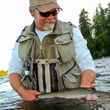
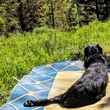
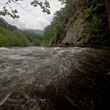
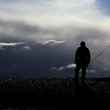
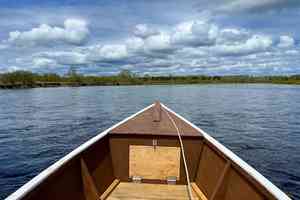


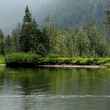
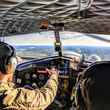
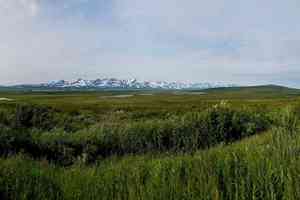

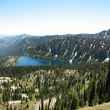
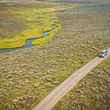
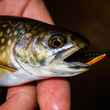



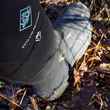
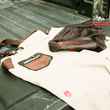



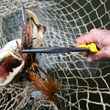
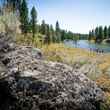
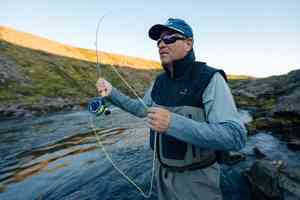

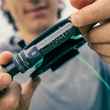
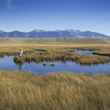
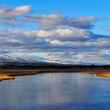
Comments
Bill Socha replied on Permalink
Tim, you are a GREAT writer. I thoroughly enjoyed reading this piece. Thankyou.
Dave Books replied on Permalink
Good story, Tim. I lived in the U.P. for a time in the 1960s, but never met Mr. Voelker. I used to drive by his house on my way to the golf course near where he lived. I have most of his books, including some of the lesser known titles. I do have his autograph (in green pen) with a short note though, thanks to friend who knew him very well. John Gierach (RIP) will be sorely missed. Trout Bum wasn't his first book, but it was the one that really launched him as a popular writer. I knew I had an early copy, but it turns out that mine is the second printing of the first edition. Years ago I e-mailed Jim Pruett and asked him about that. He said "Your copy is the second printing, the first printing had solid gold endsheets." I'll bet the first printing wasn't very large...might be worth quite a bit to a collector these days.
Pages